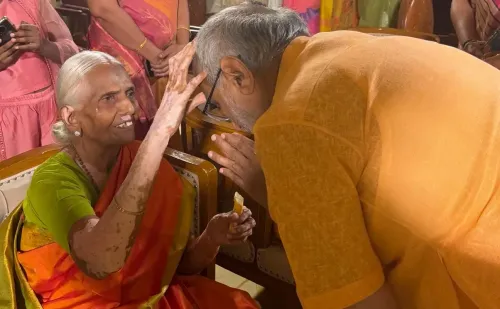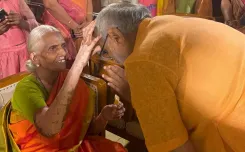Global Elephant Healthcare Workshop Conducted in Kaziranga

Synopsis
Key Takeaways
- In-depth understanding of elephant physiology and behaviour.
- Implementation of positive reinforcement techniques in training.
- Hands-on practical training for veterinarians.
- Collaboration among international experts in elephant healthcare.
- Enhancement of conservation methods through advanced veterinary practices.
Guwahati, March 2 (NationPress) In an effort to ensure high-quality medical treatment and uphold best practices in the diagnosis and care of elephants, a two-day International Elephant Health Care Workshop was conducted in Assam’s Kaziranga National Park and Tiger Reserve (KNPTR), a UNESCO World Heritage site.
KNPTR Director Sonali Ghosh stated that the workshop offered a comprehensive understanding of elephant physiology, anatomy, behaviour, disease management, and practical medical procedures. She noted that the two-day workshop, held from February 27-28, was designed to acquire extensive knowledge regarding the practical applications in elephant conservation and healthcare. The practical training segment at Kaziranga allowed participants to put their learnings into practice while treating the elephants, according to the KNPTR Director.
She emphasized that positive reinforcement techniques, which enhance the bond between mahouts and their elephants, were significant aspects of the practical training sessions. Teams of veterinarians and specialists examined both departmental and private elephants at Kaziranga to deliver direct medical care while showcasing best practices in diagnosis and treatment.
Ghosh mentioned that this hands-on method ensured the application of advanced veterinary techniques in varied environments, further bolstering conservation initiatives.
Notable experts, including Dr. Susan K. Mikota, Director of Veterinary Programmes and Research, Elephant Care International, USA; and Dr. Willem Schaftenaar, Research Associate, Elephant Care International, Netherlands, played pivotal roles in the workshop. Dr. N S Manoharan, Additional Director of Veterinary Service (Retd.), Tamil Nadu, and Dr. Bhaskar Choudhury, Manager and Head Veterinarian, Wildlife Trust of India (WTI), led various treatment procedures focusing on pain management, wound care, gastrointestinal issues, and foot care, among others.
The event was organized by Wildlife SOS in partnership with the Assam Forest Department and attracted 28 veterinarians, as noted by Ghosh, a senior Indian Forest Service officer.
Three months earlier, in a first-of-its-kind initiative, two elephant mahouts from KNPTR attended the ‘Gentle Training Workshop’ for elephant handlers, owners, and caregivers at the National Elephant Institute in Lampang, Thailand. The two mahouts, Kasim Ali (Kaziranga Range) and Sanjeev Pegu (Agoratoli Range), participated in the three-day training workshop from November 6-8 last year.
This three-day event, organized by the Human-Elephant Learning Programs Foundation (H-ELP), introduced principles and practices aimed at enhancing captive elephant welfare through an understanding of the most relevant scientific knowledge and focused on positive reinforcement techniques. The Thailand training also welcomed mahouts from Nepal, Laos PDR, Thailand, and Sri Lanka.
The KNPTR, encompassing approximately 1,300 sq km, is home to over 2,613 one-horned Indian rhinos. This renowned park is not only a sanctuary for rhinos but also houses Asian elephants, Royal Bengal tigers, wild buffaloes, and numerous other animal species, along with thousands of birds from over 125 species.
Designated as India’s seventh (fourth in natural) UNESCO World Heritage site, the KNPTR spans several districts in Assam, including Golaghat, Nagaon, Sonitpur, and Biswanath.









